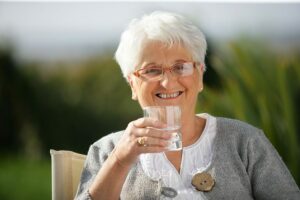Elder Care in Summit NJ
Dehydration is a very serious health concern for people of all ages, but can be particularly challenging for elderly adults because they are less likely to experience thirst signals than younger 
Getting dehydrated is not just about feeling thirsty. Continuously not giving your body the hydration it needs can lead to a wide variety of very serious health complications including kidney problems, digestive problems, overheating, heart problems, and even cognitive concerns. By recognizing the signs and symptoms of dehydration in elderly adults, and making sure that your parents’ elderly health care services provider can recognize these signs and symptoms, you can protect your aging loved ones from serious consequences and help them live a healthier lifestyle.
Signs and symptoms of dehydration in seniors include:
• Intense thirst
• Weakness
• Dry mouth
• Swollen tongue
• Sluggishness
• Fainting
• Heart palpitations
• Dizziness
• Decreased urine output
• Confusion
• Difficulty communicating
• Inability to sweat
• Deep yellow or amber-colored urine
There are some symptoms that indicate very serious dehydration and warrant an immediate call to the doctor or trip to the emergency room. Symptoms of dehydration that have reached severe and potentially life-threatening levels include:
• Constant vomiting over the course of a day, or increased vomiting
• Severe confusion, difficulty making decisions, or delirium
• Fever over 101 degrees
• Diarrhea for more than 2 days
• Weight loss
• Serious weakness
• Serious headache
• Difficulty breathing
• No urine for 12 hours
• Chest or abdominal pain
• Lethargy
• Seizures
The most important thing you can do to protect your aging parents from the effects of dehydration is to prevent it, but if they have already gotten dehydrated and it is not severe, there are ways you can treat them right at home. Try these ways to treat mild to moderate dehydration at home:
• Sucking frozen ice pops made from natural fruit juices or sports drinks, preferably those without added sugar which can actually increase the problem, particularly for those who are vomiting or have diarrhea
• Drinking sports drinks or prepared electrolyte replacement solutions to give the body back carbohydrates and electrolytes, both of which are essential for maintaining proper hydration
• Slowly sipping liquids through a straw, which has a less overwhelming effect than taking large gulps of fluids that can cause a stomach ache or choking
• Remove or loosen clothing to cool the body and lessen water loss through sweating
• Wrap an overheated person in a wet towel to lower the exterior body temperature and promote evaporation, which draws heat out of the body and quickly lowers body temperature
• Do not apply ice packs or ice water to the skin as this will cause the blood vessels to contract, actually slowing the rate of heat loss and creating shivering, which produces heat and uses up body fluid.
If you or an aging loved one are considering hiring elder care services near Summit, NJ, call the caring staff at Helping Hands Home Care today at (908-418-4299).
Providing Home Care Services in all of Northern and Central NJ, including Clark, Westfield, Cranford, Scotch Plains, Rahway, Linden, Summit, Edison, Elizabeth, Mountainside and the surrounding areas.
After graduating from Seton Hall University with a BS in finance Helping Hands Homecare’s Owner / President, Robert D’Arienzo, went to work on Wall St. for six years. However, after Robert’s grandmother became ill with stomach cancer Robert and his family needed to find assistance in the home for her. After many trials and tribulations Robert could see that there was a great need for quality home care services here in NJ and loved the idea of being able to assist other families who were going through what his family went through with his beloved grandmother.
Thus, Robert had found his passion. After almost a year of preparation Robert opened Helping Hands Homecare in 2003. Robert wanted Helping Hands Homecare to focus on providing the highest quality of caregivers, exceptional customer service, and providing a service that familys could depend on in their time of need. Since then Helping Hands has assisted hundreds of individuals with the simplest of needs to more complex cases while preserving those standards set out many years ago.
Robert is a Google Verified Author
- How Companion Care Can Help Your Parent Avoid Depression - April 22, 2025
- How Alzheimer’s Care Helps Family Caregivers - April 7, 2025
- How In-Home Care Can Help Seniors Recover from Surgery or Illness - March 24, 2025




